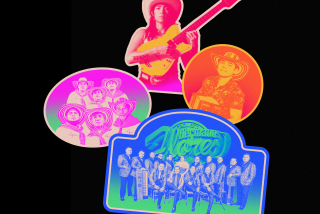Getting In on the Act
- Share via
If the opening event in the summer series of six world music concerts at the Hollywood Bowl is any indication, the programs will have a lot more to do with the sheer celebratory experience of world music than the showcasing of an individual performer. “Brazil Nights at the Bowl,” which takes place Saturday and Sunday, is a full-scale Brazilian gala, complete with instrumentalists, singers and dancers.
The choice of Carlinhos Brown to headline the event may seem a bit strange to those unfamiliar with this charismatic artist. But Brown, enormously popular in his native country and highly regarded by other Brazilian performers, is an excellent choice to fulfill producer Tom Schnabel’s desire to create an upbeat world music party. And when Brown and his large, colorful ensemble burst onto the stage, both the music and the atmosphere will be considerably different from past world music events.
“We want to do something to attract everyone’s attention,” says Brown, 37. “And I believe that it is a big party that we’re having at the Bowl. When I get there, I want to sing and play and dance for the American audience. I want to be happy with them. To me, music is organic. The audience is also part of the music, and I believe it is natural for everyone to participate.”
The percussionist and songwriter from Bahia is more than a generation removed from the bossa nova era of Antonio Carlos Jobim and Joao Gilberto, and two decades younger than more recent Brazilian stars such as Caetano Veloso, Gilberto Gil, Milton Nascimento and Ivan Lins. And since Brazilian Bowl programs of recent years have tended to center on the flow of music from those earlier figures, Brown’s songs--which are as indebted to American pop and R&B; as to the Brazilian past--may well come as a shock to audiences unfamiliar with current developments in the always bubbling melting pot of Brazilian culture.
His latest album, “Omelete Man” (on Metro Blue), will provide much of the material for his performance. Filled with an eclectic array of sounds, it refuses--like all of Brown’s music--to be restricted by either national or stylistic boundaries. Simmering with rhythms and melodies ranging from samba and reggae to R&B; and Afro-pop, it has a little something for everyone.
Says Brown, “The title of the album means a mixture of music, but it also means mixed race and culture--whatever helps bring people closer to a sense of peace. All flavors of culture. Because I believe in mixing, and in people not hurting each other. Music has no frontiers.”
Despite his relative youth, Brown has been a prominent figure in Brazilian music for well over a decade. His skill as a percussionist has made him a valuable side man, and he has performed with, among many others, Joao Gilberto, Djavan, Veloso and Joao Bosco. His songs have been equally desirable, and his material has been recorded by Veloso, Gal Costa, Daniela Mercury, Maria Bethania, Luiz Caldas and Marisa Monte (who co-produced “Omelete Man”).
He cites everyone from Hector Villa Lobos and Chico Buarque to Gilberto, Veloso and Gil as influences. But he also is quick to add that Smokey Robinson, Funkadelic, Sly & the Family Stone, Charlie Parker, Otis Redding and the Beatles also had an impact on his musical education. And Brown--whose full name is Antonio Carlos Santos de Freitas--adopted his Americanized stage name when, as a young man, his Afro hairstyle and vigorous dancing constantly generated comparisons to James Brown.
Asked how he expects to be received by an audience that does not understand Portuguese and that may be unfamiliar with his work, Brown responds with a hearty laugh.
“Well, of course, I want to gain an American audience,” he says. “But not with Brazilian songs so much as with world music. I’m the result of Gilberto and samba and Bahia, as well as Smokey Robinson, James Brown and Funkadelic. And I hope the audience will appreciate my music in the same way that Brazilians appreciate American music without knowing English. Because it’s not just about language. It’s about communication, and the intention with which it is expressed.”
An approach to music, in other words, that further underscores his belief in the irrelevance of boundaries. To Brown, each cultural style has something to offer.
“Africans,” he noted, “have added a lot of European influence to their music these days. Americans seem to be able to keep their music well-grounded. And the Brazilians seem to fly with their songs.”
And, ideally, he would like his audience to be open to the celebratory qualities that can be generated by his unique combination of those various elements.
“Look,” he says, “we are Brazilians and we also are Latins and we are also Americans. But what we should have now is no barriers between those identities, no North Carolina and South Carolina.”
“So maybe this is the best solution. Wipe out all the boundaries so we can all look each other in the eye--musically and every other way. And then you can send the Chicago Bulls coaches to Brazil to teach the people in Amazonia how to play basketball. And we can send our Brazilian coaches to your country to improve the American soccer players.”
BE THERE
“Brazil Nights at the Bowl” with Carlinhos Brown, Sergio Santos and Viver Brasil, Hollywood Bowl, 2301 N. Highland Ave. Saturday, 8:30 p.m.; Sunday, 7:30 p.m. World Festival Market in the plaza from 5 p.m. $3-$75. (323) 850-2000.
More to Read
The biggest entertainment stories
Get our big stories about Hollywood, film, television, music, arts, culture and more right in your inbox as soon as they publish.
You may occasionally receive promotional content from the Los Angeles Times.










